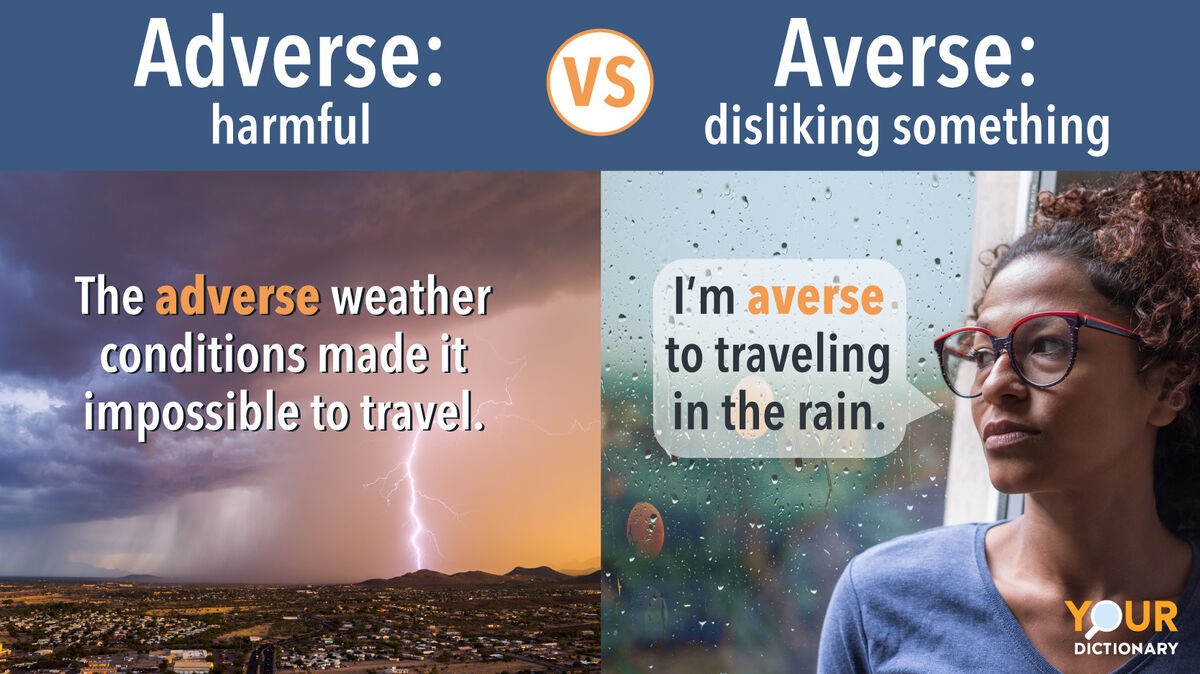Adverse means unfavorable or harmful, describing negative conditions or effects, while averse means having a strong dislike or reluctance toward something, indicating personal resistance or aversion.
In the realm of English usage and vocabulary, it's not uncommon to come across words that look or sound similar but carry distinct meanings. Such is the case with "adverse" and "averse." While these words may appear interchangeable at first glance, they serve different purposes in the English language. Let's delve into the nuances of "adverse" and "averse" to ensure you use them accurately and effectively.
Defining Adverse
"Adverse" is an adjective that is used to describe something that is unfavorable, harmful, or contrary to one's interests or well-being. It indicates a negative or detrimental quality or effect. When a situation is adverse, it means it is working against you or causing difficulties.
Example sentences
- The adverse weather conditions made driving treacherous, with heavy rain and fog reducing visibility.
- The company faced adverse financial challenges due to the economic downturn.
In these examples, "adverse" is employed to convey the idea of something being unfavorable or detrimental.
Defining Averse
On the other hand, "averse" is also an adjective, but it pertains to a person's feelings or attitudes rather than describing external circumstances. When someone is described as averse to something, it means they have a strong dislike, reluctance, or opposition to it. It reflects a personal aversion or disinclination.
Example sentences
- Sarah was averse to public speaking and always felt nervous before giving presentations.
- He was averse to taking risks and preferred safe, conservative investments.
Here, "averse" is used to highlight an individual's reluctance or resistance to a particular activity or idea.
Distinguishing the Two
To distinguish between "adverse" and "averse," remember this key difference: "Adverse" relates to negative circumstances or events, while "averse" relates to personal feelings or attitudes of dislike or reluctance.
Common Idioms and Phrases
Let's explore some idiomatic expressions that incorporate these terms:
- Adverse Weather Conditions: Refers to unfavorable or severe weather, often causing disruptions.
- Averse to Change: Describes someone who resists or dislikes changes in routine or plans.
- Adverse Effect: Signifies a negative impact or consequence.
- Averse to Risk: Indicates a person's avoidance of taking risks or preferring safety.
- Adverse Circumstances: Denotes difficult or unfavorable situations.
- Averse to Conflict: Describes someone who avoids confrontations or disagreements.
Synonyms
While "adverse" and "averse" have distinct meanings, there are synonyms that can be used interchangeably in some contexts:
Synonyms for "Adverse":
- Unfavorable
- Hostile
- Harmful
- Detrimental
- Negative
Synonyms for "Averse":
- Reluctant
- Disinclined
- Resistant
- Hesitant
- Unwilling
Practice Questions
- The company faced adverse / averse financial challenges due to the economic downturn.
- She was adverse / averse to trying new foods and preferred sticking to familiar dishes.
- The team's performance was greatly affected by the adverse / averse weather conditions during the match.
- Despite his adverse / averse attitude toward technology, he had to adapt to the digital era.
- The project's delay had an adverse / averse impact on the overall timeline.
Answers:
- adverse
- averse
- adverse
- averse
- adverse
Understanding the distinctions between "adverse" and "averse" empowers you to use these words accurately in your writing and communication, ensuring that your message is clear and effective. Keep practicing to solidify your grasp of these essential vocabulary terms.
Discover more about the AI English proofreader, Engram!

Reference














